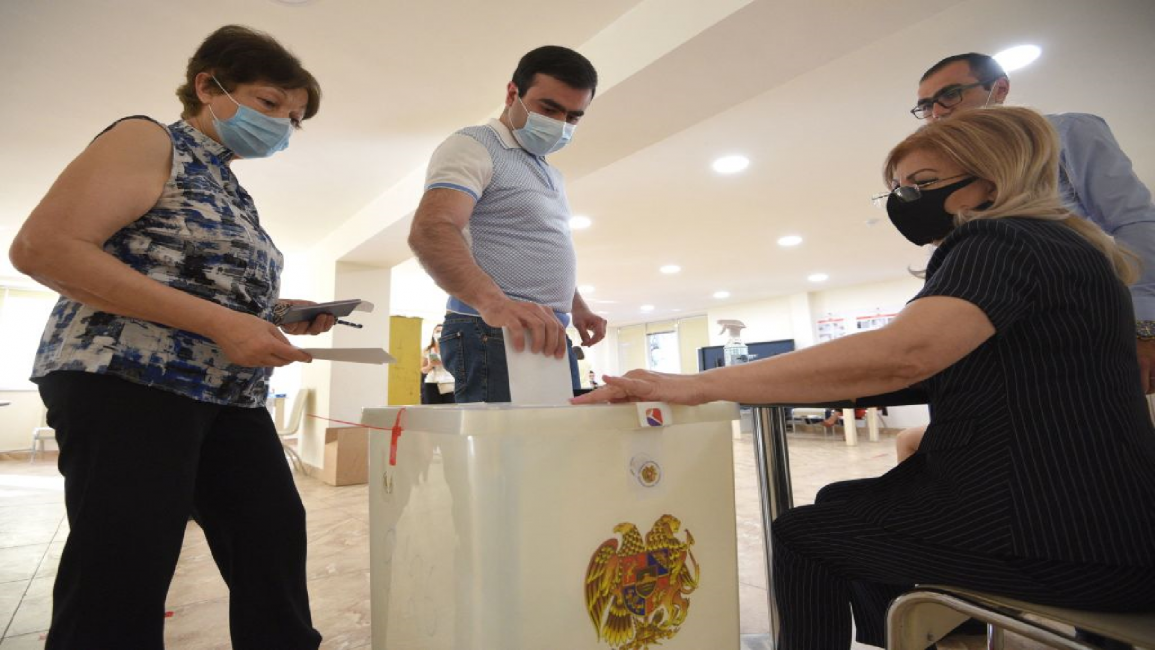Post-war Armenia holds snap parliamentary election
Armenians went to the polls Sunday in early parliamentary elections which were called in an attempt to heal the country's divisions after a disastrous war with Azerbaijan, but which could spark post-vote protests.
Reformist Prime Minister Nikol Pashinyan, who has lost much of his appeal after a military defeat last year to arch foe Azerbaijan, is hoping to renew his mandate but is in a tight race with former president Robert Kocharyan.
During a campaign marred by polarising rhetoric, Pashinyan said he expected his Civil Contract party to secure 60 percent of the vote, even though some pollsters say those estimates are far-fetched.
The election in the South Caucasus country of three million people is being watched by Armenia's Soviet-era master Russia as well as Turkey, which backed Azerbaijan in last year's six-week war over the breakaway region of Nagorno-Karabakh.
As soon as voting started, Armenians began trickling into polling stations in central Yerevan, according to AFP correspondents.
One voter, Anahit Sargsyan, said the prime minister deserved another chance, adding that she feared the return of the old guard whom she accused of plundering the country.
"I voted against a return to the old ways," said the 63-year-old former teacher.
Another voter, Vardan Hovhannisyan, said he cast his ballot for Kocharyan, who counts Russian leader Vladimir Putin among his friends.
"I voted for secure borders, solidarity in society, the return of our war prisoners, the well-being of the wounded and a strong army," said the 41-year-old musician. "Only Kocharyan can deliver that."
Critics accuse Pashinyan of ceding swathes of territory in and around Karabakh to Azerbaijan in a truce agreement that ended the fighting and of failing to deliver reforms.
Pashinyan says he had to agree to the Moscow-brokered truce with Azerbaijan in order to prevent further human and territorial losses.
More than 6,500 people were killed in the war, according to the latest official estimates from Armenia and Azerbaijan.
Analysts say the election result is hard to predict, with both Pashinyan and Kocharyan drawing massive crowds in the final days of the race.
Besides Kocharyan, who hails from Karabakh and was in power between 1998 and 2008, two other leaders of post-Soviet Armenia are backing parties in the race. All three are in opposition to Pashinyan.
A venomous campaign saw candidates exchange insults and threats and both frontrunners are expected to stage demonstrations after the election.
Pashinyan, 46, brandished a hammer at rallies, while Kocharyan, 66, said he would be ready to fight the prime minister in a duel and claimed he was planning to rig the vote.
Armenian President Armen Sarkisian, largely a ceremonial figure, decried attempts "to incite hatred and enmity" and urged law enforcement to prevent any violations.
"These elections are taking place in a difficult situation," he said on Saturday. "They are of crucial importance for our state and people."
Kocharyan, who is seen as a wealthy man, faces a corruption probe and was also investigated over a deadly crackdown on protesters more than a decade ago.
Some observers say Pashinyan might be investigated over his handling of the Karabakh war if he is voted out of power.
A poll released Friday by MPG, a group affiliated with Gallup International Association, showed Kocharyan's Armenia bloc leading narrowly with 28.7 percent to 25.2 percent for Pashinyan's party.
Following in third with 10.8 percent was an alliance linked to Pashinyan's enemy and predecessor Serzh Sargsyan.
A record four electoral blocs and 21 parties are running for election but only a handful are expected to win seats in parliament.
Around 2.6 million people are eligible to vote to elect for a five-year term the minimum number of 101 parliament members under a proportional electoral system.
A winning party needs to obtain at least 50 percent of seats plus one and can be assigned additional seats in order to form a government.
Polls will close at 8 p.m. (4 p.m. GMT) in an election being monitored by observers from the Organisation for Security and Cooperation in Europe.



